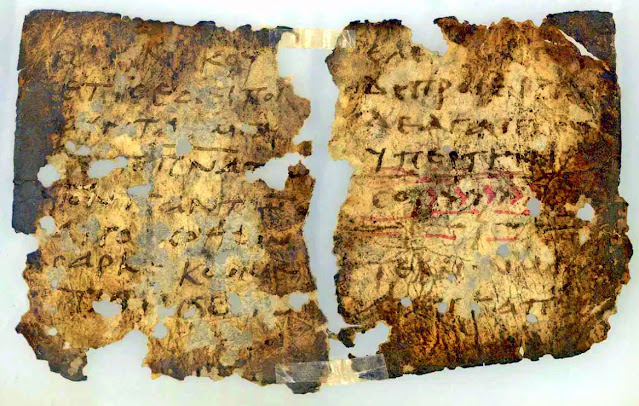Odes of Solomon, Lost Psalms of Early Christianity Discovered
“I extended my hands and hallowed my Lord,
For the expansion of my hands is His sign.
And my extension is the upright cross.
Hallelujah.” (Ode 27)
Out of all the apocryphal writings I've collected, I think the Odes of Solomon is the most beautiful, inspiring and inspired, the greatest scripture of the Jesus movement. It is the would-be book of New Testament psalms! The Book of the Odes has been described as the first known hymn-book of early Christianity. They have nothing to do with "Solomon" but somewhere-along-the-way got mislabeled and assigned to the genre of Old Testament Apocrypha as the Odes represent one of the earliest of Christian documents near the beginning of the Jesus movement within Judaism and so composed before a time when there were many Jewish or Christian writings associated with a "new" covenant, and long before the concept of a New Testament canon or collection of scriptures was conceived of. Thus, this collection of psalms was named in a way that's reminiscent of how some scriptures were assigned names during the time of the Dead Sea Scrolls and the pseudepigraphical literature. This indicates a very early date of composition.
For me the Odes, as well as another collection of mystic poems called, Metaphysical Meditations, by Paramahansa Yogananda, during my formative years as a spiritual seeker proved to be quite influential. They also gave me a preview of the type of literature I would eventually be introduced to: the Adi Granth (Sikh Scriptures) and various collections of bhakti mystic poetry of the Sants of India: Kabir, Dadu, Namdev, Paltu, Tulsi Sahib, Soamiji Maharaj, and many others.
I know a thousand Rumis the world needs to hear,
to be soothed by the Voice of the Soul
that speaks through them all.
Hafiz, Shams, Sarmad, Kabir, Mira Bai, Sahajo Bai,
Rabia, Tukaram, Hazrat Sultan Bahu, Baba Farid,
Nanak, Tulsi Sahib, Surdas, Dariya Sahib,
Dharam Das, Namdev, Ravidas, Paltu —
countless are the lovers of the Beloved.
Spiritual Awakening Radio Podcast: Odes of Solomon, Lost Psalms of Early Christianity Discovered - Listen, Download, Subscribe @ the Podcast Website:
https://SpiritualAwakeningRadio.libsyn.com/website
@ Apple Podcasts:
https://podcasts.apple.com/us/podcast/spiritual-awakening-radio/id1477577384
@ Spotify:
https://open.spotify.com/show/5kqOaSDrj630h5ou65JSjE
& @ Wherever You Subscribe and Follow Podcasts (Apple, Spotify, Amazon, Audible, PodBean, Overcast, i Heart Radio, Podcast Addict, Gaana, CastBox, etc...):
https://linktr.ee/SpiritualAwakeningRadio
The Odes of Solomon consist of 41 psalms. The Odes are believed to have originated in either Antioch or Edessa in Syriac-Aramaic most likely during the First Century AD.
One scholar (James Charlesworth) said of the Odes, "Here are some of the most beautiful songs of peace and joy that the world possesses."
The New Testament scholar Bentley Layton says that the Odes were considered to be inspired scripture and were chanted by Christians who lived in Syria and all around Mesopotamia about 2,000 years ago.
J. Rendel Harris, the discoverer of one Syriac-Aramaic manuscript of the Odes, said the Odes were eventually included in the Sahidic Bible of Egypt.
These ecstatic hymns remind me of Rumi or Sufi love poetry in the tradition of "the lover and the Beloved." They also remind me of the Sikh scriptures (Adi Granth) and mystic poetry of the Sants. Many have adopted the practice of contemplating verses of the Odes and report being brought to a deeper level of devotion (bhakti); being caught up in a love-affair with God, the Ocean of Love. That's also been my experience.
ODE 12: Through the Word (Logos)... Worlds Converse!
"He filled me with words of truth
that I may speak the same.
Like the flow of waters truth flows from my mouth,
and my lips reveal its harvest,
and it gives me the gold of knowledge
for the mouth of the Lord is the true Word
and the Door of His Light.
And the Highest One gave the Word to His worlds,
which interpret His own beauty,
recite His praise,
confess His thought,
are heralds of His mind,
are instructors of His works.
For the swiftness of the Word is ineffable
and like His statement are Its swiftness and sharpness.
Its course knows no end,
It never fails, it stands.
Its descent and Its way are incomprehensible.
Like His work is Its end
for It is the Light and the dawn of thought,
and through It worlds converse...
The mouth of the Highest One spoke to them
and he was made clear by His Word.
The dwelling place of the Word is man
and Its truth is love."
In Divine Love, Light and Sound, Peace Be To You,
James Bean
Sant Mat Satsang Podcasts
Spiritual Awakening Radio
https://www.SpiritualAwakeningRadio.com







